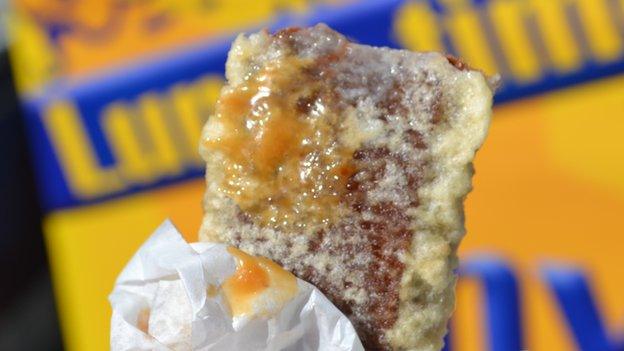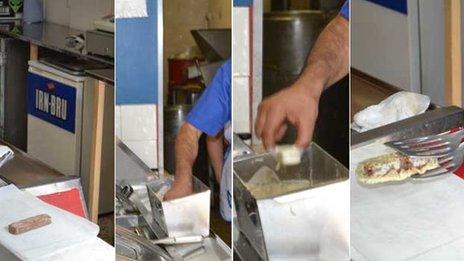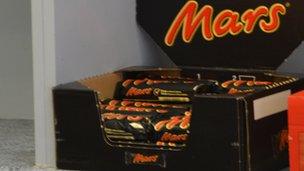Deep-fried Mars bars: A symbol of a nation's diet?
- Published

Deep-fried Mars bars are available in many chip shops, but do people actually eat them?
The deep-fried Mars bar has become a worldwide symbol of all that is wrong with the high-fat, high-sugar Scottish diet. But do people really eat them or is it a novelty item which has unfairly taken on a wider significance?
The Economist newspaper recently ran a feature on Glasgow's health record, external under the headline "No city for old men".
It was just the latest in a long line of news stories to cite "an excessive love of deep-fried Mars bars" to represent all that is wrong with the eating habits of a city and - by extension - a nation.
The roots of the phenomenon go back to August 1995 when the Daily Record reported on "Scotland's craziest takeaway".
The newspaper called the delicacy, which was being served up in the Aberdeenshire town of Stonehaven, the Mars Bar supper - the term supper often being used in Scots chip shops to describe a meal served with chips.
"Sweet-toothed youngsters are ordering their favourite choc bars deep-fried in batter," the Record said.
Soon UK-wide publications were following up on a phenomenon which seemed to speak eloquently about poor diet and the ever-increasing lengths people would go to to get a hit of sugar and fat.
By 2004, the reputation of the deep-fried Mars bar had travelled the Atlantic and it was mentioned on the Jay Leno Show in the US.
But was it true or was it an urban myth? Was it a widespread phenomenon or did its reputation outstrip its popularity?
UK medical magazine The Lancet published research eight years ago, external from two Glasgow-based public health experts who claimed never to have met anyone who had eaten one.

Take a normal chocolate bar, place in batter, put in deep-fat fryer and a few minutes later you have a dubious treat
They surveyed hundreds of fish and chip shops in Scotland to find out if "the delicacy" was available and if people were actually buying them.
It found 66 shops which sold them, 22% of those who answered the survey.
David Morrison, senior lecturer in chronic disease epidemiology at the University of Glasgow, was one of the experts who did the research.
The deep-fried Mars bar is seen as a "totem" for something which is a significant driver of ill health, obesity and high-fat diets, he says.
Morrison doesn't want to "demonise" a single food stuff but notes that it is well-known that high-fat and high-sugar foods lead to health problems.
Annie Anderson, from the Centre for Public Health Nutrition Research at the University of Dundee, used to send her medical students out into the city to see if they could find somewhere that sold deep-fried Mars bar.

Mars says it does not endorse the deep-frying of its products
"It was not much of a challenge in Dundee," she says.
And in Glasgow on Wednesday it was also a relatively simple task. Ahmed at Neptune's on Duke Street refuses to fry chocolate bars because "it turns the oil black and oil is very expensive."
But Mustapha from Denis's takeaway on the High Street is happy to oblige. He says he will deep-fry anything.
"That's my job", he says.
Mustapha says he sells one or two deep-fried Mars bars a day - more when the students are back at the nearby Strathclyde University residences.
He takes a Mars bar from the shelf, unwraps it, dips it in the same batter he uses for the fish and throws it in the fryer. A couple of minutes later he presents a soggy chocolate bar covered in batter.
The caramel squirts out when it is bitten. It is soft warm and sweet. Sickly sweet and fatty.
The Carron Fish Bar, formerly called the Haven, which began the craze, reckons it sells about 100 to 150 of the culinary concoctions a week.
But about 70% are to visitors to the town, who have heard of its reputation or seen the large sign outside saying "Birthplace of the World Famous Deep Fried Mars Bar".
Sparked into action by publicity surrounding an application for secured status under the EU's Protected Food Name Scheme, Mars has written to the fish bar asking it to make plain that deep-frying of the bars is "not authorised or endorsed" by the chocolate manufacturer.
Glasgow restaurateur John Quigley is "not a fan" of the deep-fried Mars bar, which he says "tastes disgusting". He recoils from the thought of "fat on fat" and says that if something is fatty it should be "cut with" something fresher.
Quigley, who was once a private tour chef to singer Bryan Adams, says Scotland has been trying to "shake off" its unhealthy image for 20 years and it has been succeeding in many ways.
"The deep-fried Mars bar is probably doing harm to the reputation of Scottish food because really there are not a lot of people actually eating them," he says.
But while Quigley, the chef/patron of Red Onion in the city's West Campbell Street, rejects the battered chocolate bar, he says deep-fried foods such as fish and chips still have a place.
"If you get a good fish and make the batter correctly, the fish is actually steamed. The batter is fried but the fish is not and you can remove and throw away the batter if you want.
"That's not the case with the Mars bar. They are just fat and sugar and it is really hard to cook them without the caramel escaping through the chocolate."
However, despite his distaste Quigley admits that he had a large group of 18-year-olds up from England for a birthday party in his restaurant and they requested deep-fried Mars bars.
"It was a bit of fun so I did it. I threw in some Snickers and Twixes as well and they scoffed the lot.
"It's a novelty though. You will try one once but you will not be back."